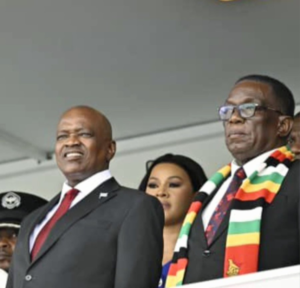ZIMBABWE ELECTORAL COMMISSION’S DECEPTIVE NARRATIVE UNVEILED AS OPPOSITION LEADER WITHDRAWS

The credibility of the Zimbabwe Electoral Commission (Zec) has been called into question once again, as the facade surrounding its claim of not printing presidential election ballot papers has crumbled with the unexpected withdrawal of Douglas Mwonzora, a prominent leader of the smaller opposition party MDC-T. This move inadvertently exposes Zec’s duplicitous tactics and raises concerns about its adherence to constitutional and legal frameworks in its management of the upcoming 23 August polls.
In a swift response to Mwonzora’s withdrawal, Zec hastily asserted that it was too late for him to exit the race. However, it’s crucial to examine this pronouncement within the context of Zec’s actions, which have continuously strayed from lawful procedures. The commission’s urgency to prevent Mwonzora’s withdrawal stems not from a genuine commitment to upholding the law, but rather from a desire to conceal its covert ballot printing activities that bypass legal protocols.
This issue is further underscored by the clash between Zec and independent presidential election candidate Saviour Kasukuwere. Kasukuwere’s challenge to Zec revolves around the allegation that the commission printed ballot papers prior to concluding the legal proceedings regarding his removal from the electoral race, a clear violation of constitutional standards.
If Zec accepts Mwonzora’s withdrawal, it would be compelled to reprint the ballots minus his name – a task that carries both significant cost implications and logistical challenges. The race against time becomes palpable with a mere 15 days remaining until polling day, making the process of reprinting a considerable hurdle. Zec, seemingly driven by the dual pressures of time and money, finds itself in the convenient position of arguing against Mwonzora’s withdrawal on legal grounds.
Underlying the seemingly legal argument, however, is Zec’s unspoken agenda. The assertion that a candidate cannot withdraw 21 days before an election serves as a convenient shield for the commission’s own interests – to camouflage its deceptive practices and illegal activities. It becomes evident that Zec is not solely concerned about the integrity of the election process; rather, it is more invested in safeguarding its reputation and concealing the discrepancies within its operations.
Zec’s persistence in keeping Mwonzora in the electoral race serves its own vested interests, reflecting an attempt to obfuscate the truth and mask its transgressions. The commission’s track record of skirting legal boundaries raises doubts about its commitment to transparent and fair elections. The urgency to preserve its narrative at the expense of upholding democratic principles puts into question the overall legitimacy of the upcoming polls.
As the nation watches these developments unfold, it is imperative to acknowledge the far-reaching implications of Zec’s actions. The withdrawal of Mwonzora has inadvertently illuminated the underlying tactics employed by the commission, exposing a chasm between its words and actions. While Zec may argue that it operates within the confines of the law, its deeds convey a different story altogether.
The withdrawal of Mwonzora has inadvertently pulled back the curtain on Zec’s carefully crafted narrative. The commission’s response to his withdrawal showcases its prioritization of self-preservation over transparency and legality. As the electoral countdown continues, the nation remains vigilant in demanding a fair and just democratic process that aligns with the principles of the constitution.



